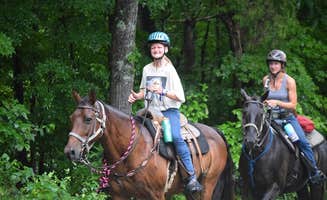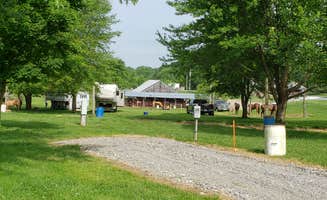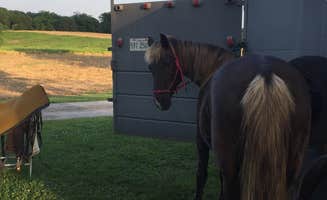Equestrian camping opportunities near Makanda, Illinois range from basic facilities to full-service options throughout Shawnee National Forest. The region sits at elevations between 400-600 feet with limestone and sandstone formations creating distinctive landscapes for trail riding. Summer temperatures average 85-90°F with high humidity, while spring and fall offer more comfortable riding conditions with temperatures between 60-75°F.
What to do
Trail riding throughout the year: Kincaid Lake's Johnson Creek Recreation Area provides riding options on the northwestern edge of Shawnee National Forest. "There are a few trails that connect to this spot... close to lake kinkaid and johnson creek," notes reviewer em P. The area features "single, double, and triple camping spots set up on three loops in this small campground."
Visit local breweries after rides: Equestrians looking to relax after trail rides can explore nearby Scratch Brewery in Ava. "Delicious and unique little place that is off the beaten path. Only open on weekends, but highly recommend," shares Stacia R. about this destination near Johnson Creek.
Fishing between trail rides: Dutchman Lake Camp offers horse campers fishing opportunities between trail adventures. "Great little spot right off the interstate. Lots of nice scenery and decent fishing," notes Jonathan H. The proximity to Interstate 57 makes this spot accessible for horse trailers and provides a convenient stopping point during multi-day trips.
What campers like
Diverse equestrian-friendly hiking trails: Riders appreciate the variety of terrain at Giant City State Park. "The Giant City Nature Trail and Devils Standtable were really pretty, easy strolls. The Trillium Trail is a little more rugged for those who prefer less crowded, slightly tougher trails," says Shana D. This diversity allows riders to choose appropriate paths based on their horses' experience levels.
Cleanliness of equestrian facilities: The maintenance of horse camping areas receives positive feedback. At Ferne Clyffe's Equestrian Campground, campers note the upkeep: "Campsites are quiet and well taken care of," reports Hannah H. This attention to maintenance ensures better experiences for both horses and riders.
Wildlife observation opportunities: South Sandusky Campground provides equestrians with chances to observe local fauna during rides. "We heard several owls calling in the trees around us when we went to bed, so we stayed up listening for awhile. In the middle of the night we were startled awake by a pair of owls in the tree right above us," describes Joel R., highlighting the natural encounters possible while camping with horses in the region.
What you should know
Trail conditions vary significantly: Trail quality changes seasonally, affecting horse access. "The trails weren't always maintained it definitely depends on the season but the park itself is not to be missed," notes Ashley Y. about Giant City State Park, suggesting riders check conditions before hauling horses to the area.
Limited water hookups at some camps: At Shawnee Forest Campground, "No water hook up at each site, only electricity," reports Shana D. Horse owners should plan to bring water containers or identify filling stations before arrival.
Reservation systems differ between parks: While some campgrounds require advance booking, others operate on first-come systems. At South Sandusky, "Reservations accepted on reservation.gov. Walk-ins also welcome," shares Mary F., indicating flexibility for last-minute equestrian camping trips.
Trail markings can be inconsistent: Johnson Creek received this observation: "The trail itself is tricky. It does have markings, which keep you on the trail, but there's no way of knowing how far along the hike you are," notes Daniel B., suggesting riders bring maps or GPS devices when exploring.
Tips for camping with families
Choose campgrounds with designated horse-friendly trails: Ferne Clyffe's Equestrian Campground connects directly to park trails. "Trails to and from the campground all across the park, great personnel, accessibility throughout the park," recommends Hannah S. This setup allows families to ride directly from their sites without trailering horses.
Consider campgrounds with playgrounds: For families mixing horse activities with general recreation, South Sandusky provides options. "Fishing. Swimming, hiking, boating, playgrounds. Water and sewer hookups with 30/50 amp electric. Lots of shade. Friendly staff," mentions Rhonda M., highlighting amenities that keep children entertained between rides.
Look for campgrounds with educational opportunities: Giant City State Park once featured interpretive programming. "The park used to have an interp center but I believe the state closed it due to funding," notes Ashley Y., but families can still create educational experiences using park resources and trail guides to learn about the area's geology and wildlife while riding.
Tips from RVers
Size limitations affect horse trailer parking: Many horse campers bring RVs alongside horse trailers, requiring assessment of site dimensions. At Deer Ridge Campground, "The sites are big and there are hiking trails right from the campground," reports Jim C., indicating adequate space for equestrian rigs.
Electric hookup availability varies: Crab Orchard National Wildlife Refuge offers power for RVs with horse trailers. "Large sites, lots of room. We camped with several other families and everyone enjoyed this park," writes Joel R. The spacious sites accommodate both living quarters and horse transport needs.
Seasonal road conditions impact access: During wet seasons, access roads to equestrian camps may deteriorate. At Johnson Creek, "You can get potable water at the entrance. We camped here mid-April and the campground water spigots had not been turned on yet," notes Stacia R., illustrating the importance of checking seasonal facilities before traveling with horses.




